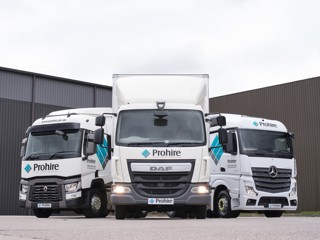This editorial feature appears in the April, 25 2019 issue of Fleet News and is sponsored by Northgate Vehicle Hire
Describing vehicle rental to a fleet decision-maker as ‘your flexible friend’ is almost as old as the Access credit card adverts from the 1980s where the phrase originated.
Providing the opportunity to hire cars and vans from as little as part of a day to much longer periods has always ensured that rental provides flexibility to an organisation.
Read the sponsor's comment by Neil McCrossan, sales and marketing director, Northgate Vehicle Hire

The flexible rental services everyone is currently talking about, however, take this a step further, says Oliver Waring, managing director of Reflex Vehicle Hire, because customers do not have to specify a date or time for vehicles to be returned.
This provides the ultimate flexible fleet because customers can source the vehicles – vans or cars – and keep them for as long as required before handing them back, without an early termination penalty, when circumstances change.
And there are plenty of contributors to the uncertainties and increased costs of running a fleet at the moment: Brexit, London’s ultra-low emission zone (ULEZ), the Worldwide harmonised Light vehicle Test Procedure (WLTP) and changes to the benefit-in-kind (BIK) company car tax framework beyond the 2020/21 tax year are just some of them.
“Also, companies are having to apply a more flexible approach to staff movement as workforces become more transient,” says Peter Crabtree, corporate sales director at Europcar Mobility Group UK.
“The rigid fleet policies of the past with a typical retention period of three-to-four years are therefore becoming much less appealing for today’s businesses.
“The question to ask is whether a one-size-fits-all approach is still appropriate and whether all fleet operators should include more flexible solutions as part of their overall fleet policy.”
An uncertain and costly environment is not one in which organisations particularly want to be locked into long-term lease and contract hire agreements or substantial vehicle purchases when there is a more flexible and responsive alternative.
Caroline Gallagher, sales director of Thrifty Car & Van Rental, says flexible rental deals that allow customers to have access to vehicles from one day to a year or longer without being tied into a fixed-term contract, early termination penalties or deposits “allow total management of a variable fleet requirement in an uncertain and rapidly changing business environment (and allow) customers to increase (or) decrease fleet immediately, but adapt for tomorrow as business requirements change”.
Different models
Definitions, however, vary. Peter Eldridge, director of ICFM, the car fleet management training body, for example, says flexible rental is any form of short-term vehicle rental that extends beyond the typical one-to-27 day period.
Others, such as ACFO, the fleet operators’ association, say it covers a period ranging from three-to-12 months.
Ian Bennett, daily rental operations manager at Ogilvie Fleet, says its own flexible short-term hire choice runs from a single day to a year, while Activa Contracts’ Rental Plus deal requires hiring for a minimum of 84 days, as does Europcar Mobility Group’s model.
Northgate’s Flexible Hire is a minimum three-month commitment, but vehicles can be changed whenever required during that period.
Flexible rentals can either be used to supply extra vehicles or an entire fleet and when businesses may need to increase or decrease staffing at a moment’s notice. Gallagher says this type of hire is expanding across all vehicle types and will continue to do so “during this extended period of economic uncertainty”.
Not all flexible rental options are the same so it is very much beholden on fleet managers to do their homework.
Julie Summerell, digital chairman and company secretary of ACFO, says: “Flexible rental is not only a relatively new product in the marketplace, but it comes with different names coined by myriad providers.”
Gallagher stresses: “It’s important to remember that terms and conditions may vary between providers so it is always vital to check and discuss the small print in agreements.”
It is an operational decision as to whether flexible rental is viable. It is a range of products that continues to evolve, whereas contract hire is long established and mature.
With Activa Contracts’s Rental Plus model, customers are required to insure vehicles themselves so they are responsible for damage risk. A mileage allowance of 2,500 miles a month, equal to 30,000 miles a year, is included, above which excess mileage is charged.
“Some flexible rental products may have no damage or mileage penalties,” says Activa Contracts managing director Ian Hill, “but this is not compatible with the low rental rates as suppliers cannot realistically bear unlimited damage, service, maintenance and repair and depreciation costs – the facts of life are that miles cost money.”
Europcar Mobility Group offers four mileage options starting at 1,000 miles going up to 2,800 per 28 days. “Excess mileage charges are applied when the vehicle comes off hire,” says Crabtree.
Eldridge says: “The basic premise of flexible rental is that the renter should benefit from more competitive rates than those associated with short-term hire and have more freedom to operate the vehicles than would otherwise be the case with contract hire or leasing.
“There is no formal notice period for the return of the vehicle and, on the face of it, no hidden charges. From a cost perspective, the monthly charges will, of course, be more expensive than contract hire because of the reduced utilisation commitment.”
He adds that any charges applied at the end of the rental period should be transparent and linked to a pre-understood arrangement.
David Brennan, chief executive at Nexus Vehicle Rental, claims that flexible models help keep fleet costs lean because vehicles are only paid for when they are in use, unlike alternatives.
Similarly, companies operating such vehicles are protected against the costs of depreciating assets that occur with outright purchase.
“A fixed-rate rental fee is the main component of flexible rental and this means fleet managers are not caught out by variable rates and can manage budgets effectively,” he explains.
Flexible rental vehicles also tend to be newer and well maintained, he adds, so clients are less likely to incur downtime.
Brennan points out that for customers in, say, the construction industry, even having one vehicle out of action can cause a major operational headache and delays in project schedules.
“In the unlikely event a newer rental vehicle would experience downtime, a replacement can be sourced immediately at no extra fee, keeping jobs on track and businesses moving.”
Flexible rental vehicles can also be supplied with company livery. Eldridge says the sector is full of offers from rental companies to provide bespoke modifications that meet various customer requests for racking, refrigeration and other business-critical inclusions.
“The only restrictions are the cost of the vehicle commissioning in relation to the period of use and the legal requirements associated with construction and use/gross vehicle weight,” he adds.
The fleet sector has seen a drop in vehicles acquired by rental companies, but Eldridge says the rental companies have offset this by extending the vehicle retention period.
He cautions that flexible rental does not have the protection of a long-term leasing agreement. “Does that mean that the end user potentially incurs more risk of a vehicle being recalled? Well the answer is, of course, yes.It is all about choices, the attitude to risk and commitment to the longer term.”
The beginning of the end of contract hire?
Used correctly, flexible rental has the potential to replace more traditionally funded vehicles on a fleet.
“The days are numbered for traditional contract hire,” says Graham Telfer, fleet manager at Gateshead Council, which has between 280 and 300 vehicles on flexible arrangements at any one time (see case study, page 53) through Northgate.
“We have to be more flexible and fluid in how we operate now because, traditionally, local authorities or public sector organisations knew the life expectancy of a vehicle because there was a commitment to ongoing building programmes and other services.
“If there was a year-on-year change then we would be stuck with those vehicles for the duration of contract life.
“Traditionally, a number of other fleet managers have tried this but there has been a control that you can return maybe up to 20% of your fleet without penalty or up to 30%, whereas now we’ve negotiated up to 100% return of our fleet and we’ve seen a decrease in our rental rates.”
However, ACFO feels the growth in flexible rental does not mean the end of traditional contract hire or outright purchase; simply that fleets are opting for a mix of acquisition methods as a wider choice of solutions emerge.
“Flexible rental is, effectively, a bolt-on solution,” says Summerell.
Spread risk
The ICFM advises fleet managers not to put all their eggs in one basket, noting that there is no single magic solution to the significant challenges that fleet operators face currently and no single answer that will satisfy all requirements.
“This is a time for strategic and planned thinking and if fleets are going to prosper then they must create a structured balance with the vehicles they operate, the method of acquisition and the duty of care requirements of the business,” says Eldridge.
So is the model here to stay?
Ogilvie Fleet believes the trend will continue even when current uncertainty is resolved.
“Flexible rental…should be treated as a short-term solution to fill a void for up to about six months, but longer in certain circumstances,” says Ogilvie Fleets’ Bennett.
Flexible rental: where it can be used
Key areas where flexible rental can support a business include:
New joiners: providing cars on an interim basis to new starters during their probation period or while employees wait for a new company car or van.
Supporting new contracts: providing immediate vehicle support for new contracts to ensure a business can respond quickly to client needs.
Enabling growth: growing businesses need to concentrate funds on expansion so flexible vehicle hire allows them to support growth without having funds tied up in vehicles.
Planning for change: flexible vehicle hire is designed to help companies cope with business change. In uncertain economic times, it is vital that businesses can be agile and quickly respond to market developments and that includes the vehicle fleet, which can expand and contract to reflect changing demand.
Vehicle trials: as companies consider new vehicle alternatives such as plug-in hybrid and electric, a flexible hire partner can support a business trial at scale while also helping a business minimise risk should its strategy change.
Delivering an agile fleet: flexible vehicle hire is not just for times of change; it can be a valuable part of any fleet operation, providing a source of vehicle supply that cost-effectively offers more flexibility and support than traditional contract hire or daily rental.
Source: Reflex Vehicle Hire
Case study: Gateshead Council
The ongoing effects of austerity in the public sector has led Gateshead Council to take on around 300 vehicles on flexible rental with Northgate.
“(With austerity) we’ve had to look at more cost-effective ways – not just looking at the hire rate, but at the add-ons, dealing with fines, the cost of the administration and return of vehicles,” says Graham Telfer, fleet manager at Gateshead Council.
“We’ve just gone into the first formal flexi agreement in the past 10 months through Northgate.
“We have 280-300 vehicles on flexible arrangements at any one time. The rest are all outright purchase. There is no capital outlay and we don’t own the vehicle so I can forecast my fixed costs.
“We don’t pay fuel surcharges or administration charges on fines. We take accountability for the fine but we don’t pay any add-on charges.
“We return the vehicle filled with fuel. If in the event of a vehicle going back and it’s not refilled they are only allowed to charge us the pump price – not an extra 20% or 30% handling fee.
“We agree they’re entitled to the cost of the fuel and we control that at our end to make sure that’s kept to an absolute minimum.”
He adds: “The trade-off for Northgate is it knows the public sector is going to be a regular customer, we consolidate the invoicing so the admin is kept to a minimum and we have fixed monthly invoicing that we pay up front a month in advance so they know that that capital is going to go into their business without fail.”
 The modern business environment is 24/7, and customers expect swift and effective services. As a result, businesses must be able to respond as quickly as possible.
The modern business environment is 24/7, and customers expect swift and effective services. As a result, businesses must be able to respond as quickly as possible.
When these requirements extend to vehicles, it is especially important that near-constant mobility is ensured and that fleet operations run smoothly, with minimal disruption.
More than ever, businesses are making rental their go-to mobility solution, to enable fleet managers to become more agile in a fast-paced market.
Vehicle hire is a practical alternative
to leasing or purchase, allowing customers to hire as and when they need, for up to 48 months. We can also buy your old vehicles with our We Buy, You Rent solution.
Our rental packages provide numerous benefits and take away administrative burdens for fleets. By renting their vehicles businesses gain access to the latest technology, meaning their fleet will always be compliant with the latest regulations.
Vehicles are maintained and serviced, road-tax is taken care of and customers can also customise the vans to make sure they meet their needs. And, if things change, they can return or swap the hire vans to keep their drivers on the road.
With more than 35 years’ experience, Northgate provides bespoke fleet management services that offer businesses a range of flexible, fair and financially savvy hire plans.
As the UK’s largest LCV rental supplier with 58 branches and workshops across the country and more than 52,000 vehicles on the roads, our objective is to help you to keep your business moving with a solution that suits your needs.



















Login to comment
Comments
No comments have been made yet.